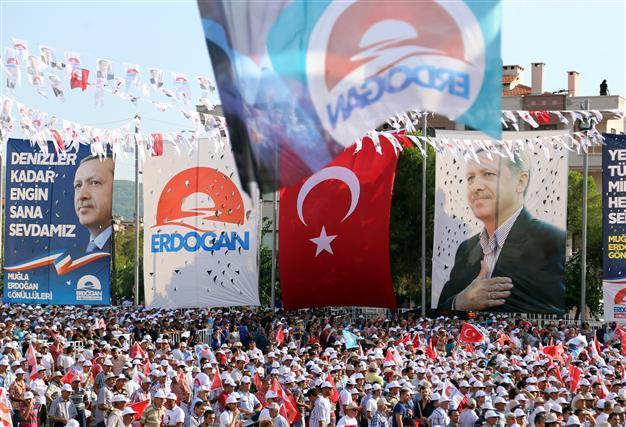Research expert: Turkey led by ‘identity politics’
Cansu Çamlıbel

'If your approach is admitting the notion of being pro-Erdoğan and anti-Erdoğan and creating politics according to this game, instead of trying to change the game, it is certain that you lose,' Bekir Ağırdır says.
The presidential elections have shown that Turkey is stuck with “identity politics,” General Manager of the KONDA Research Company has said.Speaking to daily Hürriyet, as part of a week-long series of analyses of the country’s first-ever presidential elections by popular poll, Bekir Ağırdır, the head of KONDA, said yesterday’s voting continued an ongoing trend that was confirmed in the local elections.
“This was confirmed in March 30: All four parties are representatives of one identity,” Ağırdır said. “The Justice and Development Party [AKP] is the party for the religious, the conservative. The Republican People’s Party [CHP] is the party for the seculars, laicists, or modern [people] with worries. The Nationalist Movement Party [MHP] is the nationalists’ and the Peace and Democracy Party [BDP] is the Kurds’. Turkey is stuck to four parties of identity politics.”
Ağırdır added the situation is not “superficial,” and has its sociological reflections in society. “In the past, the identities were pushing the parties, but now parties are manipulating the identities and shaping their sociological bases,” he said.
Ağırdır said the AKP is not getting all its votes from being religious, but from its power and Recep Tayyip Erdoğan’s leadership character.
“AKP has the psychology of rage against what is standing against them,” he added.
When thinking of Erdoğan’s rivals, Ekmeleddin İhsanoğlu and Selahattin Demirtaş, they used a more moderate tone in their election campaigns, Ağırdır said there was not enough time.
“[It did not work in the polls] Because there was no time,” he said before adding “polarization in the society” is becoming increasingly evident in the country.
Polarization could be seen in the presidential election results, Ağırdır said, adding the polls were determined by being “pro-Erdoğan” or “anti-Erdoğan,” citing that as a result of the oppositions’ failure.
“Erdoğan’s supporters are moving with confidence, with a hope for tomorrow and a claim. The others, meanwhile, move with fear, desperation and panic,” he said.
“If your approach is admitting the notion of being pro-Erdoğan and anti-Erdoğan and creating politics according to this game, instead of trying to change the game, it is certain that you lose,” he added. “You need a candidate to have a word to change this situation. It is not about Mr. İhsanoğlu’s character.”
Ağırdır said Turkey passed the second of its three-election period, following the March 30 elections and next year’s general elections and showed that the country needs change.
“Regardless of the parties and the candidates, the three elections have a different meaning for Turkey,” he said. “Today, the state order, the administration and the law are not enough for the life in Turkey today.”
“You can look at it as the Kurdish issue, the corruption, the parallel state, or the Gezi [protests]: The state is not responding to life in Turkey,” he said. “This structure is centralized, stereotyping and very bureaucratic. Turkey cannot continue like that. So, the new groups to emerge after these three elections will give us clues on the new Turkey after 2015.”
















